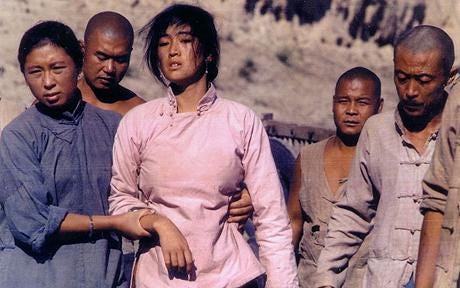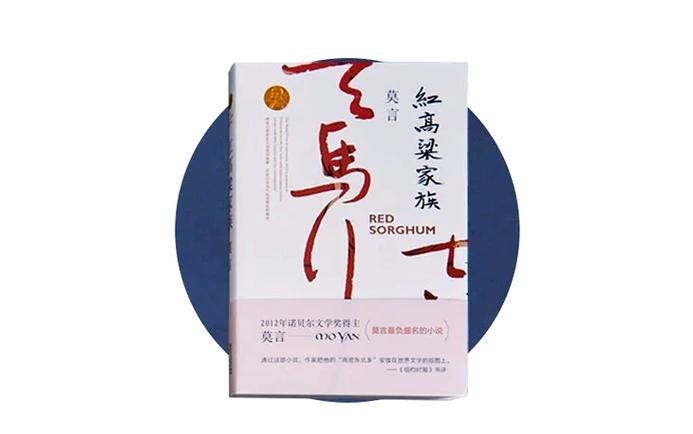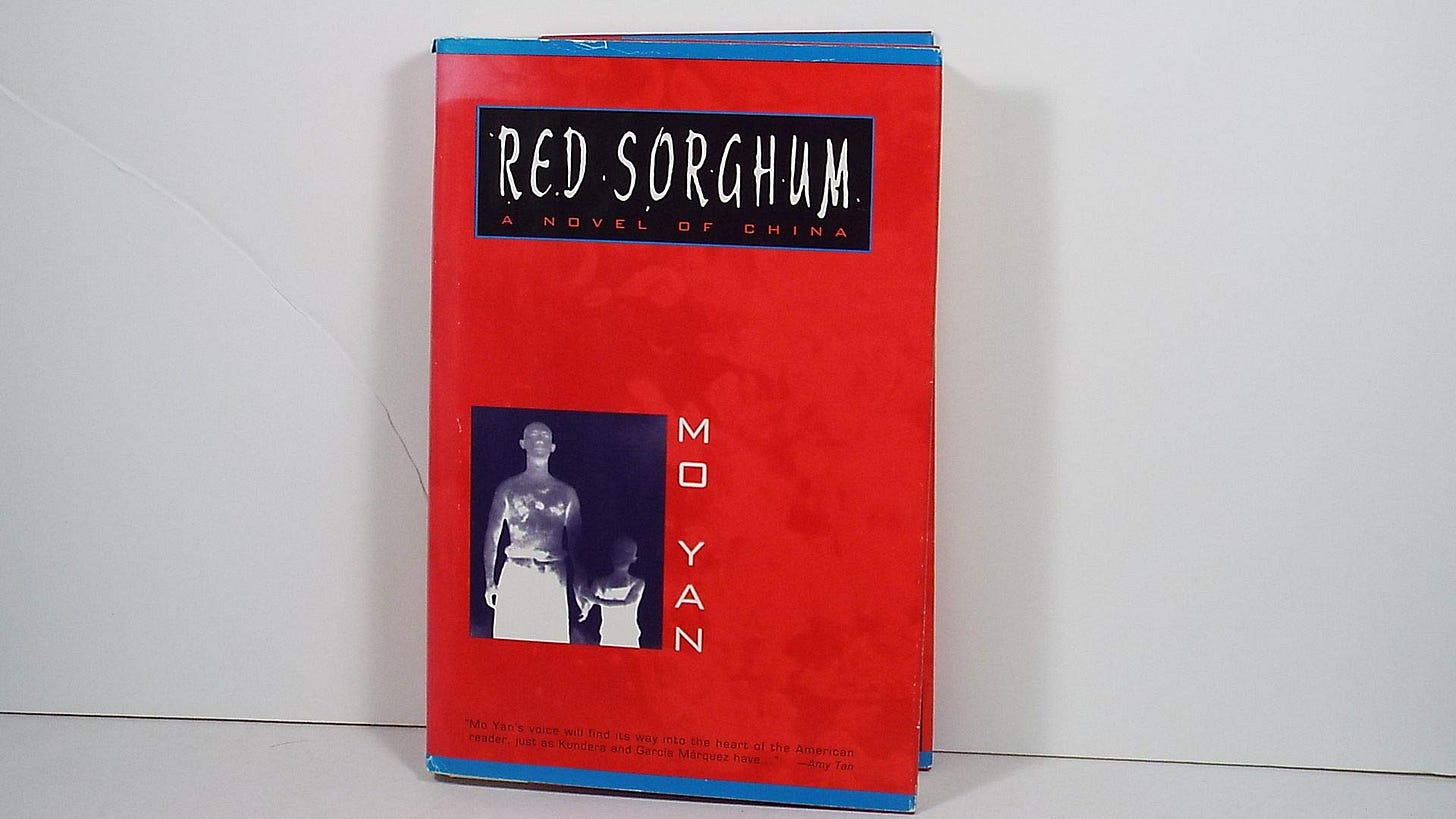Rural China Book of the Month (April 2025): Red Sorghum by Mo Yan
A Bleak and Uncompromising Portrait of China’s Tormented Past.
Why This Book Matters
In Red Sorghum (红高粱家族), Mo Yan offers more than fiction—he gives a raw testimony to the suffering that has shaped rural China.
His first novel—fractured into five interconnected novellas—lays bare the brutality of a people torn between survival and violence, a history marked by bloodshed and loss. Told through the eyes of a nameless narrator, it unfolds across three generations, chronicling the turmoil of a Shandong family as they distil sorghum wine, then later take up arms against Japanese invaders, and, finally, witness the disillusionment of post-war China.
At the novel’s heart is red sorghum—the grain that sustains the family while simultaneously symbolising the cold indifference of nature. Amidst war, famine, and betrayal, the sorghum grows, its resilience mirroring the persistence of life even as human beings fall victim to their own cruelty.
In Mo Yan’s hands, this ordinary crop bears witness to years of suffering, steadfast and unmoved by the devastation surrounding it.
The novel’s fragmented, non-chronological style mirrors the disjointed nature of Chinese history. Time is a blur in Mo Yan’s universe, a series of disorienting jumps from past to present, life to death, myth to reality.
These fractures reflect the fragmentation of individual lives and the soul of rural China, struggling to make sense of the violence it has endured. Using magical realism, Mo Yan blurs the line between memory and myth. Superstition sits alongside violence. Beauty and horror come together without warning. Time folds in on itself, and history refuses to stay linear. What emerges isn’t a clean story, but a broken mirror—showing a country shaped by what it’s tried to forget.
About the Author
Mo Yan, born Guan Moye (管谟业) in 1955 in Gaomi, Shandong, is a well-known novelist and short story writer throughout China. He adopted the pen name Mo Yan (莫言), which can be translated as “don’t speak” or “silent speech,” reflecting advice his parents gave him during the Cultural Revolution. The name carries a deeper, metaphorical meaning, urging caution in a society marked by political repression.
Mo Yan’s fiction, often called “magical” or “hallucinatory realism” in Chinese, weaves surreal imagery with stark social critique, exposing the tangled realities of history, politics, and rural life. Deeply influenced by his rural upbringing, Mo Yan regularly critiques the enduring struggles of Chinese peasants while exploring themes of violence, power, and identity.
His output, which includes The Republic of Wine and Life and Death Are Wearing Me Out, has earned him numerous accolades, culminating in the Nobel Prize in Literature in 2012. His works are celebrated for their vivid imagery, complex characters, and critical exploration of Chinese society, even as they spark controversy for their ambiguous relationship with the state.
A Word on the Translation
Howard Goldblatt’s translation brings Mo Yan’s evocative prose into English with an unflinching sensitivity to the novel’s sorrowful undercurrent. Through his words, the reader can feel the dust of the Shandong plains, taste the bitterness of the sorghum wine, and hear the echoes of a country wrestling with its ghosts. Goldblatt ensures that Mo Yan’s raw, poetic style retains its soul in English, capturing the languor and intensity of the original text.
“a bright sun darkens, a full moon wanes, a full cup overflows, and decay follows prosperity”
Mo Yan, Red Sorghum
A Raw Portrait of Rural China: The Weight of History
Red Sorghum is a brutal, unflinching portrait of a land shaped by suffering. From 1923 to 1976, we follow one family in Shandong as they live through resistance, betrayal, and the daily fight to survive. The slow work of making sorghum wine plays out alongside the horrors of war and political upheaval. History doesn’t sit in the background—it presses in from all sides.
Mo Yan doesn’t romanticise rural life. His writing pulls the reader into the mud, the blood, the hunger. Joy is brief. Pain is constant. Magical realism doesn’t soften the blow—it makes it stranger, more vivid. Love dies. Youth fades. Time moves on whether you’re ready or not.
The novel’s broken structure reflects a fractured world. Memory jumps. Time skips. There’s no clean arc, no final redemption. What remains is endurance—life continuing, like the red sorghum that grows year after year, feeding people who have already lost so much.

Adaptations and Cultural Impact
In 1988, Zhang Yimou’s film adaptation of Red Sorghum brilliantly captured the melancholy of Mo Yan’s novel, earning the Golden Bear at the Berlin Film Festival. Like the novel, the film reflects the stark beauty of China’s rural landscape, portraying the human cost of survival in a harsh, indifferent land. The film remains the most powerful interpretation of Mo Yan’s vision—and one of Zhang Yimou’s early masterpieces, grounded in raw, authentic storytelling, before his later turn toward stylised blockbusters.
In 2014, the story was adapted for television, further embedding Mo Yan’s bleakly poetic narrative in modern Chinese culture. The series, however, received far less critical acclaim than Zhang Yimou’s 1988 classic.
Master List of Rural China Book of the Month
December 2024: Pang, Xiaowei. Farmer: Photographic Portraits. 18 March 2023.
January 2025: Ang, Yuen Yuen. China’s Gilded Age: The Paradox of Economic Boom and Vast Corruption. 9 July 2020.
February 2025: Ash, Alec. The Mountains Are High: A Year of Escape and Discovery in China’s Rural Enclaves. 2024.
March 2025: Yu, Xiuhua. Moonlight Rests on My Left Palm: Poems and Essays. Translated by Fiona Sze-Lorrain. 2021.
April 2025: Mo Yan. Red Sorghum: A Novel of China. Translated by Howard Goldblatt. 1993.






I love your work. Turns the focus to an important part of China, the countryside. Please keep doing it and thanks for sharing your work
Great review! I am gonna make it my next read!